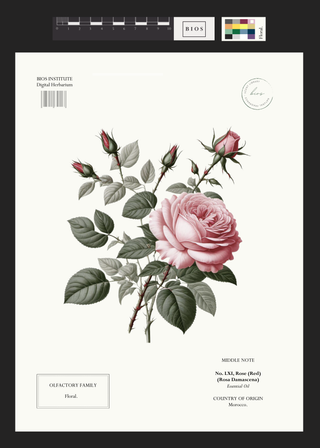

Rosa damascena, commonly known as the Damask rose or Rose of Castile, is believed to be native to the region of modern-day Syria, specifically the city of Damascus. Hence, the name "Damask rose" is derived from its association with Damascus.
However, Rosa damascena is widely cultivated in various countries across the world, including Bulgaria, Turkey, Iran, India, and Bulgaria. Ours is sourced from Morocco, where it is believed that the cultivation of Damask rose could have occurred several centuries ago through various trade and cultural exchanges.
Rose has a rich, floral scent that is often described as romantic, elegant, and timeless. The scent can vary depending on the variety of rose used and the extraction method, but it generally carries a balance of sweet, fresh, and slightly spicy notes.
Rose is a versatile ingredient in perfumery and can be used in various fragrance compositions. It can be used as a dominant note, creating a classic and romantic scent, or as a supporting note to enhance and complement other fragrance ingredients. It is a Middle note found in our Floral family.
Rose is often associated with love, passion, and beauty. It carries deep emotional symbolism and is often used in perfumes designed to evoke feelings of romance, sensuality, and femininity. Rose fragrances can create a sense of luxury, warmth, and elegance.
There are numerous varieties of roses used in perfumery, each with its own unique scent profile. Some popular rose varieties in perfumery include Damask rose, Bulgarian rose, and Centifolia rose. Roses are also often blended with other floral, fruity, or woody notes to create complex and nuanced fragrances.
Overall, rose is a cherished and versatile flower in perfumery, renowned for its timeless beauty, captivating scent, and cultural significance. Its presence in perfumes can evoke a range of emotions and create a sense of luxury and romance.
In Christianity, the rose is associated with the Virgin Mary and is often used in religious ceremonies and devotional practices. It is considered a symbol of purity, love, and divine grace. Roses are often offered as a tribute to Mary and are used in the decoration of altars and sacred spaces during religious celebrations.
In Sufi traditions, particularly in Persian and Islamic mysticism, the rose is a symbol of divine love and spiritual longing. It is used metaphorically to represent the soul's journey towards union with the Divine. The fragrance of roses is believed to awaken and uplift the heart, aiding in the contemplation of divine mysteries.
In Hindu rituals and ceremonies, rose petals are often used as offerings to deities. They are scattered or showered upon idols and sacred objects during prayers, pujas (ritual worship), and religious festivals. Roses are also used in garlands and floral arrangements for adornment purposes.
In Ayurveda, the ancient Indian system of medicine, rose is highly valued for its therapeutic properties. Rose water and rose essential oil are used in various Ayurvedic treatments, rituals, and beauty practices. Rose-infused preparations are believed to have a calming and balancing effect on the mind, body, and spirit.
In Persian culture, rose water and rose petals are used in rituals and celebrations. They are a prominent feature in weddings, where they are sprinkled on the couple as a symbol of blessings and purity. Rose water is also used in traditional Persian cuisine and as a refreshing fragrance in homes.
In traditional Chinese medicine, rose is valued for its therapeutic properties and is used in herbal remedies. It is believed to have cooling and soothing effects on the body and mind. Rose tea and rose-infused preparations are used to promote relaxation, balance emotions, and improve overall well-being.
Rose
- Unit price
- /per
Please note this product format is a small vial that contains roughly 20 drops of scent concentrate. This can be purchased à la carte but is intended to be used with our Perfume Kit.
SCENT SPECIFICATIONS
Latin Name: Rosa Damascena
Extraction Method: Hydro Distilled
Country of Origin: Morocco
All of the scents in our library are naturally derived - our collection includes essential oils, absolutes, concretes, isolates, enfleurage, macerations, oleoresins, and mixed medium naturals.
Adding product to your cart
Rosa damascena, commonly known as the Damask rose or Rose of Castile, is believed to be native to the region of modern-day Syria, specifically the city of Damascus. Hence, the name "Damask rose" is derived from its association with Damascus.
However, Rosa damascena is widely cultivated in various countries across the world, including Bulgaria, Turkey, Iran, India, and Bulgaria. Ours is sourced from Morocco, where it is believed that the cultivation of Damask rose could have occurred several centuries ago through various trade and cultural exchanges.
Rose has a rich, floral scent that is often described as romantic, elegant, and timeless. The scent can vary depending on the variety of rose used and the extraction method, but it generally carries a balance of sweet, fresh, and slightly spicy notes.
Rose is a versatile ingredient in perfumery and can be used in various fragrance compositions. It can be used as a dominant note, creating a classic and romantic scent, or as a supporting note to enhance and complement other fragrance ingredients. It is a Middle note found in our Floral family.
Rose is often associated with love, passion, and beauty. It carries deep emotional symbolism and is often used in perfumes designed to evoke feelings of romance, sensuality, and femininity. Rose fragrances can create a sense of luxury, warmth, and elegance.
There are numerous varieties of roses used in perfumery, each with its own unique scent profile. Some popular rose varieties in perfumery include Damask rose, Bulgarian rose, and Centifolia rose. Roses are also often blended with other floral, fruity, or woody notes to create complex and nuanced fragrances.
Overall, rose is a cherished and versatile flower in perfumery, renowned for its timeless beauty, captivating scent, and cultural significance. Its presence in perfumes can evoke a range of emotions and create a sense of luxury and romance.
In Christianity, the rose is associated with the Virgin Mary and is often used in religious ceremonies and devotional practices. It is considered a symbol of purity, love, and divine grace. Roses are often offered as a tribute to Mary and are used in the decoration of altars and sacred spaces during religious celebrations.
In Sufi traditions, particularly in Persian and Islamic mysticism, the rose is a symbol of divine love and spiritual longing. It is used metaphorically to represent the soul's journey towards union with the Divine. The fragrance of roses is believed to awaken and uplift the heart, aiding in the contemplation of divine mysteries.
In Hindu rituals and ceremonies, rose petals are often used as offerings to deities. They are scattered or showered upon idols and sacred objects during prayers, pujas (ritual worship), and religious festivals. Roses are also used in garlands and floral arrangements for adornment purposes.
In Ayurveda, the ancient Indian system of medicine, rose is highly valued for its therapeutic properties. Rose water and rose essential oil are used in various Ayurvedic treatments, rituals, and beauty practices. Rose-infused preparations are believed to have a calming and balancing effect on the mind, body, and spirit.
In Persian culture, rose water and rose petals are used in rituals and celebrations. They are a prominent feature in weddings, where they are sprinkled on the couple as a symbol of blessings and purity. Rose water is also used in traditional Persian cuisine and as a refreshing fragrance in homes.
In traditional Chinese medicine, rose is valued for its therapeutic properties and is used in herbal remedies. It is believed to have cooling and soothing effects on the body and mind. Rose tea and rose-infused preparations are used to promote relaxation, balance emotions, and improve overall well-being.
